This is the third in a three-part series on Roraima in the context of Brazil’s general elections. The project was supported by the Pulitzer Center’s Rainforest Journalism Fund.
Rorainopolis, Brazil – Luiz Gomes is nervous about the prospects of Brazil’s presidential election, which heads to a second round on Sunday.
As the owner of a sawmill in Nova Colina, a logging district in Rorainopolis in southern Roraima state, he fears that a more “environmentalist” government could suffocate the local timber trade, which he says is already in decline. Gomes blames excessive “bureaucracy” and crackdowns on illegal logging that have closed dozens of Roraima sawmills, including a 2020 raid in which one logger was shot dead.
“The industry broke a lot, because what happened was that people who were working according to the law … suffered in the same way as others who were illegal,” Gomes told Al Jazeera. He believes the re-election of far-right President Jair Bolsonaro, who favours a hands-off approach to environmental regulation, could revitalise the industry.
“This election is very decisive for us,” he said. “Our support here is totally with President Bolsonaro.”
While critics abroad and in Brazil’s coastal capitals have denounced Bolsonaro’s environmental record citing soaring Amazon deforestation, raging fires and an uptick in violent attacks on Indigenous lands, the president enjoys widespread support in Roraima. In the first round of the election earlier this month, Bolsonaro won close to 70 percent of the vote in Roraima – the highest percentage of any Brazilian state.
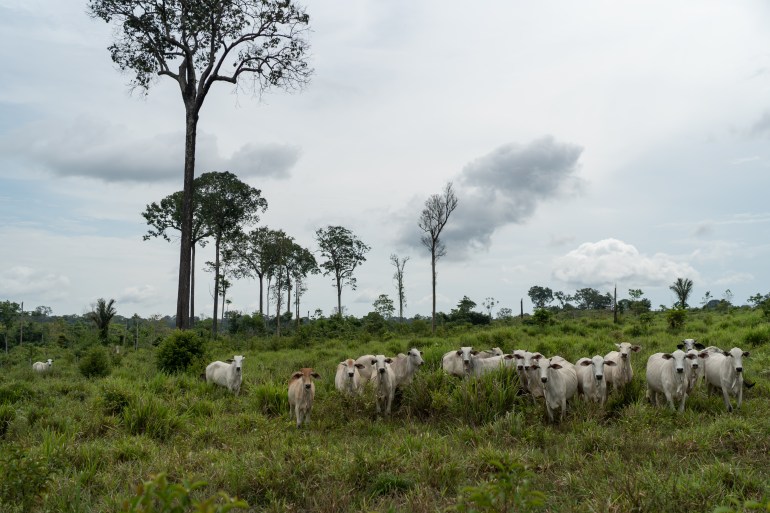
His rival, Luiz Inacio Lula da Silva, the left-wing former president who has pledged to crack down on Amazon deforestation, currently leads national polls by a narrow margin, but performed the worst in Roraima of any state.
Since Bolsonaro took office in 2019, southern Roraima has seen a dramatic uptick in deforestation, according to Paulo Barni, a professor of forest engineering at Roraima State University. The region is “currently one of the most threatened parts of Brazil’s Amazon”, he told Al Jazeera.
“[We have reached] a new frontier of deforestation,” Barni said, citing illegal logging, speculative land grabbing and cattle rearing as the main drivers.
According to government data, in 2019, Roraima registered 590 square kilometres (228 square miles) of forest cleared, the highest level on record for the state since 1989. About 300sq km (116sq miles) were cleared in each of 2020 and 2021, with most of the deforestation occurring in Rorainopolis and other towns in the state’s southern region. In the decade before Bolsonaro took office, the average annual figure was about 170sq km (65sq miles).
Settlers from across the Brazilian Amazon have flocked to southern Roraima in recent years as land prices have risen in other areas where soybean production, today one of Brazil’s most profitable commodities, has grown, Barni said.
“People sell 100 hectares [of land] in Rondonia, then they buy 500 hectares [1,235 acres] here, or more,” he said.
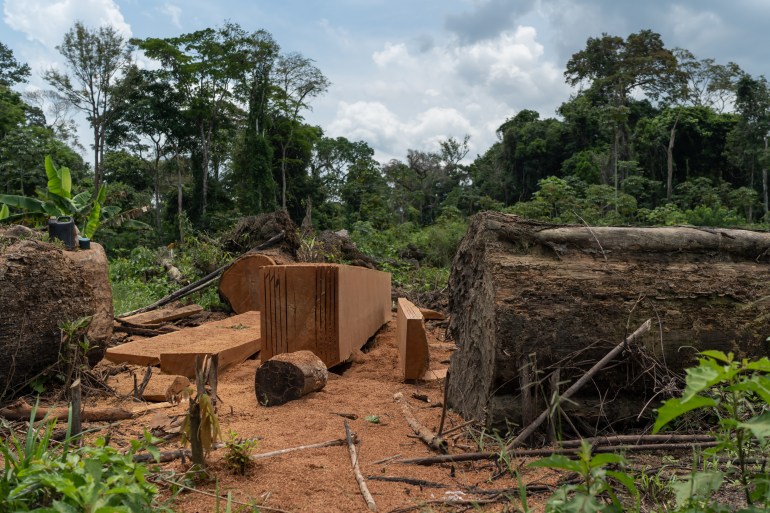
Staking claims
Daniel Alves da Silva was born in Sao Paulo, but since 2000, he has moved around the Brazilian Amazon, working as a carpenter and furniture maker in logging districts. He moved from Rondonia to southern Roraima to work in the local timber trade about a decade ago. In 2020, he bought a 12 hectares (30 acres) plot of land in Bairro Uniao, a rural squatter’s settlement on the outskirts of Rorainopolis, and built a house.
“When I arrived, there was here nothing, just forest,” Silva told Al Jazeera at his home, where he grows fruit and raises chickens.
In Brazil’s vast Amazon states, it is common for settlers and small-scale farmers to squat to stake their claim to land, before eventually selling the plot to a large farming operation and moving on – a process that experts say perpetuates deforestation. This process is sometimes encouraged by large-scale farmers seeking to expand their holdings.
Driving to Silva’s property, signs of deforestation and land speculation are clear: cattle graze among toppled trees in recently cleared fields, and a huge tree trunk rests by an improvised sawmill. Many plots of land have for-sale signs with WhatsApp numbers.
Cattle rearing typically follows deforestation in Brazil’s Amazon, and over the last decade, the number of cattle in Rorainopolis has nearly doubled to 80,000, according to Brazil’s Institute of Geography and Statistics.
Silva, who retired from carpentry after most local sawmills closed amid police crackdowns on illegal logging, says he is now planning to sell his land and move to a larger plot in a remoter part of southern Roraima, where he plans to raise cattle. Like many in Rorainopolis, he supports Bolsonaro: “His talk is real; for me, he has looked after Brazil well.”
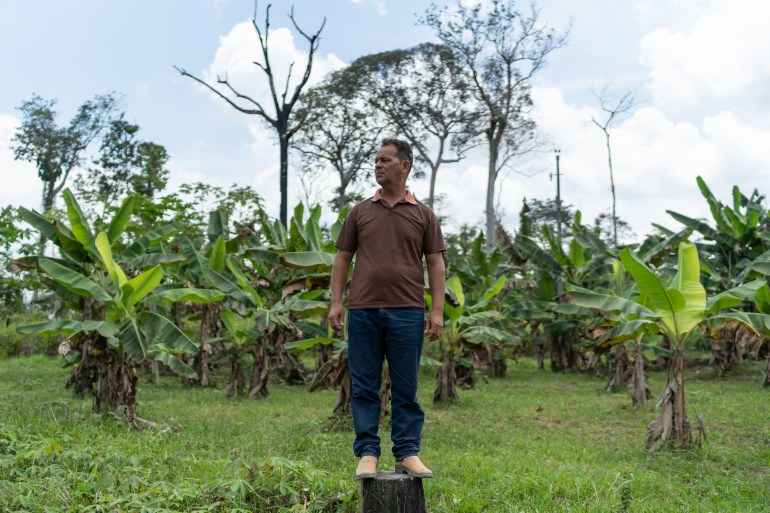
Fuelling deforestation
Along with settlers and landowners from other parts of Brazil, biofuel operations have developed in southern Roraima in recent years. Palm oil plantations can be seen along the BR-174 highway in Rorainopolis, along with workers and transport trucks. Brasil BioFuels, which produces palm oil, describes Roraima as a “new agricultural frontier”; it cultivates thousands of hectares of palms in the southern town of Sao Joao da Baliza.
But the growth of palm oil production can indirectly fuel deforestation, as small landowners of degraded pastures sell to large companies and then move on elsewhere, a Roraima State University study concluded.
Elsewhere in the Amazon, in Para state, Brasil BioFuels has been accused of encroaching on Indigenous lands, where members of the Turiwara community say they were shot at by security guards working for the company. One person died. Brasil BioFuels has said the company was not involved in the incident.
Of Brazil’s Amazon states, Roraima is the most isolated, but that may soon change.
In July, Brazil’s environmental regulator granted an initial permit to pave the BR-319 highway that connects the Amazonian capital of Porto Velho in Rondonia state with Manaus in Amazonas. Currently, much of the highway is unpaved, rendering it practically unusable for cargo vehicles, especially during the rainy season. Observers say the news has prompted an increase in settlers moving to southern Roraima.

“Roraima is one of the last frontiers. What impedes this is the access,” Barni said.
Construction of highways in Brazil’s Amazon has long been a major driver of deforestation and human rights abuses, with the Trans-Amazonian Highway, often nicknamed the TransMisery, constructed during Brazil’s military dictatorship, being the most infamous case. In Roraima, the BR-174 highway, which connects the state with neighbouring Amazonas, decimated the Waimiri-Atroari Indigenous population.
‘Waiting to invade’
Today, Indigenous communities in Roraima, such as Yanomami and Raposa Serra do Sol, have been grappling with an uptick in illegal mining operations since Bolsonaro’s election. In the state’s southern region, the area surrounding the Wai-wai Indigenous land in the town of Caroebe has become a new focus of deforestation, with Wai-wai ranking among the most-threatened Indigenous territories in the country, according to a recent report by the Imazon research group.
Raimundo Nonato da Conceicao, who grows bananas on the outskirts of the Wai-wai region, says he has been approached several times about selling his land, but he has refused. Al Jazeera surveyed the region near his home with a drone, revealing vast tracts of land that had been deforested.
Conceicao also supports Bolsonaro’s re-election, noting that he was forced to leave an illegal gold-mining operation in Yanomami after a crackdown by authorities.
“I left with nothing,” he said. “Bolsonaro might not be the best, but he is fighting for our battle for the Amazon.”
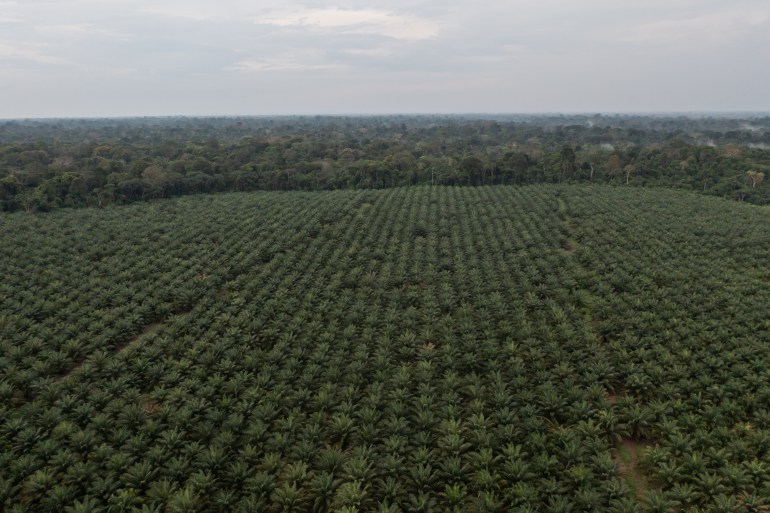
Southern Roraima is also home to the isolated Pirititi Indigenous group, who have seen about half their territory – which is not yet fully protected by the state – claimed by land grabbers, according to a recent report from Brazil’s Socio-Environmental Institute. The territory is currently protected by a temporary order that runs out this December.
“We know that the settlers around there know exactly when the order runs out, and are waiting to invade the territory,” Alisson Marugal, a federal prosecutor based in Roraima, told Al Jazeera.
Southern Roraima has long been at the heart of some of Brazil’s largest environmental scandals involving illegal timber extraction.
In 2018, authorities carried out a record seizure of illegal timber in the Pirititi region, where they found more than 7,000 illegally cut logs – enough to fill 1,000 trucks.
In 2012, police uncovered a vast deforestation scam involving businessmen, corrupt federal agents and fraudulent environmental licences. “With fraudulent documents, they would remove timber from anywhere – Indigenous lands, conservation units – under the guise that it was legal,” Alexandre Saraiva, who headed the federal police in Roraima at the time, told Al Jazeera.
As federal police chief of the neighbouring Amazonas state, Saraiva went on to lead Brazil’s largest-ever seizure of timber in 2021, after which Bolsonaro’s then-environment minister, Ricardo Salles, resigned his post. Saraiva was also removed from his post in a move that was widely regarded as political persecution.
Salles and Saraiva ran for Congress this year for Sao Paulo and Rio de Janeiro, respectively; only Salles was elected.
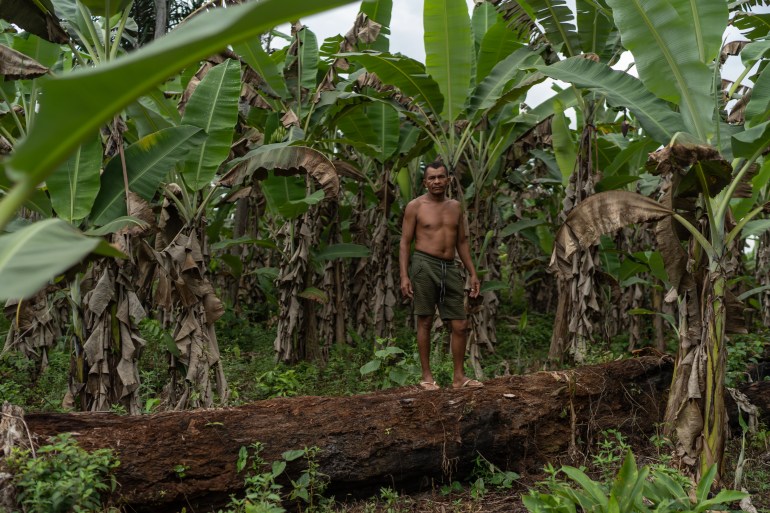
Declining industry
Between August 2020 and July 2021, 40 percent of the timber extracted in Roraima was unauthorised, according to a study by Imazon. The previous year, the total amount of timber removed in the state was 87 percent higher, reflecting the decline of the timber trade.
Gomes, the sawmill owner in Rorainopolis, maintains that he works within the law, but he also blames federal police for the local industry’s decline. Although he was recently able to export a shipment of timber to Belgium, he says he cannot secure bank loans to expand his business due to the industry’s maligned reputation. To help combat this, he uses an app called “Logger” that purports to trace timber from its source.
But Saraiva says it is still extremely easy to disguise the illicit origins of Amazonian timber, and loggers “have a political shield”.
According to Gomes, as the local timber trade has weakened, some of the labour force has moved to illegal mining. But in this month’s elections, Roraima did not elect any environmentalist or left-leaning local legislators, federal lawmakers or senators – and Gomes’s pick for governor, Bolsonaro ally Antonio Denarium, easily won the state race.
He hopes that regardless of who wins the national race, local politicians will work together to bring southern Roraima’s logging industry back to life.
“When the timber trade is strong, even the guys that sell kebabs on the street are raking it in,” he said.

World - Latest - Google News
October 28, 2022 at 10:52PM
https://ift.tt/nNQFRBx
Brazil votes: Amazon loggers hope for Bolsonaro victory - Al Jazeera English
World - Latest - Google News
https://ift.tt/wo3ROzZ
Bagikan Berita Ini














0 Response to "Brazil votes: Amazon loggers hope for Bolsonaro victory - Al Jazeera English"
Post a Comment